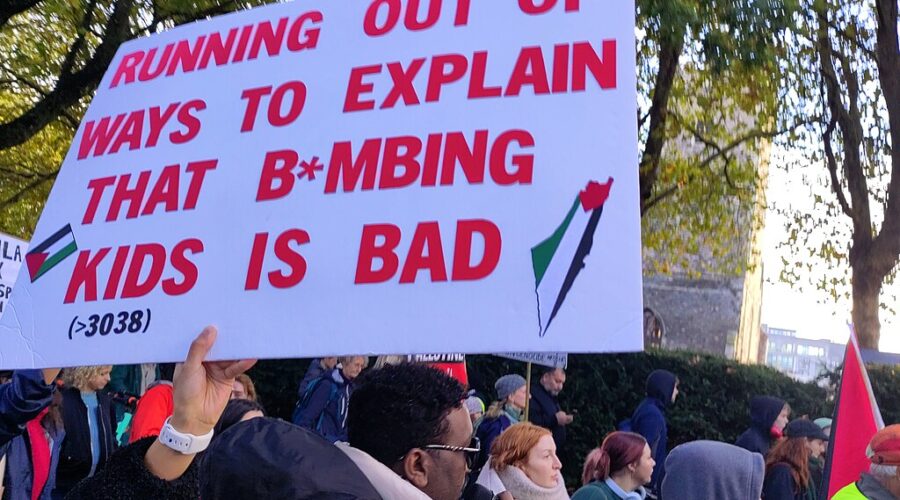While the world remains focused on the ongoing war between Israel and Hamas, the Russian military is attempting to make tactical gains in Ukraine. At the same time, some political circles in the Kremlin reportedly believe that the West – if the conflict in the Middle East escalates – will not be able to continue supplying weapons to the Ukrainian Armed Forces.
After Israel declared war on Hamas on October 8, following an unprecedented attack by the militant group on the Jewish State, the international media coverage of the Russian invasion of Ukraine has dropped markedly. According to reports, prior to the meeting of the European Union Foreign Ministers in Luxembourg on October 23, journalists did not ask the EU High Representative for Foreign Affairs and Security Policy Josep Borrell a single question about Ukraine. More importantly, they did not agree on releasing a €500 million tranche of the European Peace Facility (EPF) to support the Ukrainian militarily. Previously, on October 5, EU leaders stated that the bloc “will not be able to fully replace the American support for the war-torn country”.
It is, therefore, not surprising that some Ukrainian analysts have started making predictions on how their country can continue fighting the war without (or at least with rather limited) Western aid. Russian President Vladimir Putin claims that Ukraine could not survive “for more than a week” without Western military and financial support. The United States, on the other hand, suggests that it will continue arming both Ukraine and Israel. At least for now.
“We’re coming near to the end of the rope. Today we announced $200 million in additional military aid for Ukraine, and we’ll keep that aid going as long as we can, but it’s not going to be indefinite,” White House national-security spokesman John Kirby said on October 11.
Thus, if the conflict in the Middle East escalates, Ukraine might have a hard time preserving the status quo on the ground, since the US will be likely preoccupied with the developments in Western Asia. More than four months after Kyiv launched its ambitious counteroffensive in the southeast of the war-torn country, it became obvious that its forces made very few gains, failed to achieve any of its strategic goals, and suffered huge losses. Meanwhile, the Russian military seems to have managed to consolidate its positions and even regain the initiative.
According to reports, Russia is now attempting to seize the town of Avdiivka in the Donbass, and is conducting intense attacks in multiple sectors of the Eastern Front. Although Russians appear to be suffering major losses, Moscow’s military cooperation with North Korea – namely arms supplies from the “most isolated country in the world” to the Russian Federation – might allow the Kremlin to continue implementing its suicidal frontal assault military tactics trying to capture Ukrainian well-fortified positions.
Given that the opposition in Russia – both pro-Western and the so-called turbo-patriots – has been silenced, even if the Kremlin continues wasting human resources, armaments and materials in Ukraine, such a policy is unlikely to have a serious impact on Vladimir Putin’s reign. Russia is not Israel, where people – despite the state of war – recently came out to protest and demand the country’s Prime Minister Benjamin Netanyahu’s resignation. Instead, the Kremlin continues suppressing any voices that criticize the way it is conducting the so-called special military operation in Ukraine.
In an attempt to preserve a pro-war sentiment at home, some Russian officials insist that the conflict between Israel and Hamas will have an impact on the developments in Ukraine. The West, in their view, will be forced to reduce, or possibly even completely halt its military aid to Kyiv. A similar narrative has been dominating the Russian political scene since 2014 when pro-Kremlin propagandists claimed that Ukraine would “freeze to death” without Russia, or that the West will “collapse” and will not be able to keep the Eastern European country in its orbit anymore.
But even if the Western powers stop arming Ukraine – something that at this point does not look very probable – that does not mean that Russia will resolve the conflict in its favor, since there does not seem to be a political will in the Kremlin to “fight until victory”. Instead, Moscow, as well as some political forces in the West, will likely seek to put the war in Ukraine “on hold”, the same way they “froze” the Donbass conflict in 2015 when representatives of Russia, Ukraine, Germany, and France signed the Minsk Agreement.
There are, however, very influential circles in Europe and the United States determined to continue supporting Ukraine as long as it takes. It remains to be seen which option will prevail. But regardless of the outcome of the internal political battle in “decision-making centers” in the West, for the foreseeable future the Ukraine war will almost certainly continue to be overshadowed by the developments in the Middle East.
Image: michael warren

